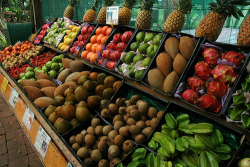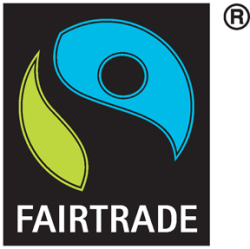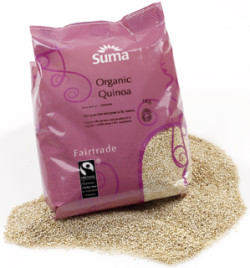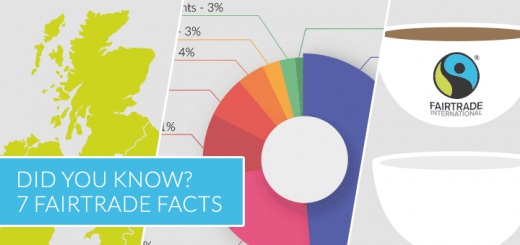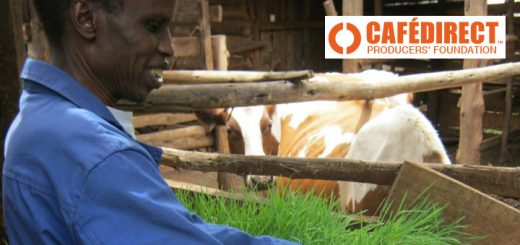The A-Z of Fairtrade: Part 2
Here’s my A-Z of Fairtrade: Part 2; following on from Part 1.
J – JUICES: A lot of fruit used for juice production is grown on plantations ran by farmers who cannot compete with the International market in terms of production costs. This means that many plantations rely on temporary workers who face low wages and poor living conditions. The Fairtrade movement helps small farmers to survive on the world market by selling their products for a guaranteed price that is independent from market developments. Fairtrade also guarantees a fair wage for plantation workers and secures humane living and working conditions.
K – KENYAN FLOWER INDUSTRY:Fairtrade certification provides an independent verification that the workers on large-scale flower farms have decent wages and working conditions; including the right to join a trade union, the right to negotiate collectively with the employer on terms and conditions of employment, freedom from discrimination, no child labour, and a safe and healthy working environment.
January and February 2008 saw rioting and protests in Kenya due to charges of vote rigging following December elections which badly affected it’s three major foreign currency earners – tea, flowers, and tourism. On some Fairtrade certified farms premium money was used to assist the workers and management to be able to fulfill orders from the UK and other markets, despite fuel and fertiliser shortages and the need for military escort for all transportation.
February is obviously a crucial time for flower farmers, what with Valentine’s Day and Mothers Day orders coming in, and thanks to the Fairtrade Premium they were able to maintain production so that after the violence had passed, the business which so many people have come to rely on could function as normal.
Fairtrade flowers were first sold in the UK in March 2004 and the Fairtrade flower category now comprises 75 licensed products.
Similar organisations offer the opportunity to buy flowers grown with an emphasis on social sustainability and a controlled and traceable supply chain such as the Fair Flowers Fair Plants initiative.
L – LABEL: The Fairtrade Label or Fairtrade Certification Mark is is a registered certification label for products sourced from producers in developing countries. According to the Fairtrade Foundation, “For a product to display the Fairtrade Mark it must meet international Fairtrade standards which are set by the international certification body Fairtrade Labelling Organisations International (FLO). These standards are agreed through a process of research and consultation with key participants in the Fairtrade scheme, including producers themselves, traders, NGOs, academic institutions and labelling organisations such as the Fairtrade Foundation.”
M – MINIMUM PRICE: The Fairtrade Minimum Price is the lowest possible starting point for negations between a producer and a purchaser. It is not a fixed price but is set at a level which ensures that producers receive a price which covers the cost of sustainable production for their product. When the market level falls below the Minimum Price, the purchaser must still pay the agreed price, however, when the market price rises higher than the Minimum Price, the market price must be paid. This ensures the ability to grow a sustainable business and gives the producer a safety net in tough market conditions.
N – NUTS: Fairtrade Nuts are comparatively new in the Fairtrade product range. Fairtrade-certified nut and oilseed producer organisations are located in Africa, Asia, and Latin America. By embracing Fairtrade, as long as quality requirements are met, small farmers can receive guaranteed market access via the Fairtrade Certification process. In 2005 the first Fairtrade Labelled nuts were brought to the UK which prompted the set-up of Liberation Foods CIC, where the farmers own 42% of the company and have a say in decision making and a share of profits.
O – OXFAM: Oxfam helped establish the Fairtrade Foundation in 1992 and continue to be a huge supporter and ambassador of all things Fairtrade. They stock a range of Fairtrade food and gifts and work hard to eliminate the abuse and exploitation of anyone in their supply chain. Most recently, you may be aware of their Make Trade Fair campaign which has many offshoots including Pants To Poverty.
P – PREMIUM: The Fairtrade Premium is a sum of money paid on top of the agreed Fairtrade Minimum Price. It is to be used for investment in social, environmental or economic development projects, decided upon democratically by producers or workers. Typically, the Premium is invested in education, healthcare, farm improvements or processing facilities.
Q – QUINOA: Quinoa (pronounced keen-wah) has been cultivated in South American Andes since at least 3000 BC, and has been a staple food of millions of native inhabitants. The Incas called quinoa the “mother grain” and revered it as sacred. Quinoa is high in protein, iron, and calcium, and is a relatively good source of vitamin E and several of the B vitamin family, making it a healthy choice for all, especially vegetarians and vegans. It is a versatile, nutritious ingredient which can be used in soups, casseroles, stews and stir fries, as well as cold in salads, breakfast cereals and baking. You can buy Fairtrade Quinoa from Ethical Superstore.
Read More: The A-Z of Fairtrade: Part 3

